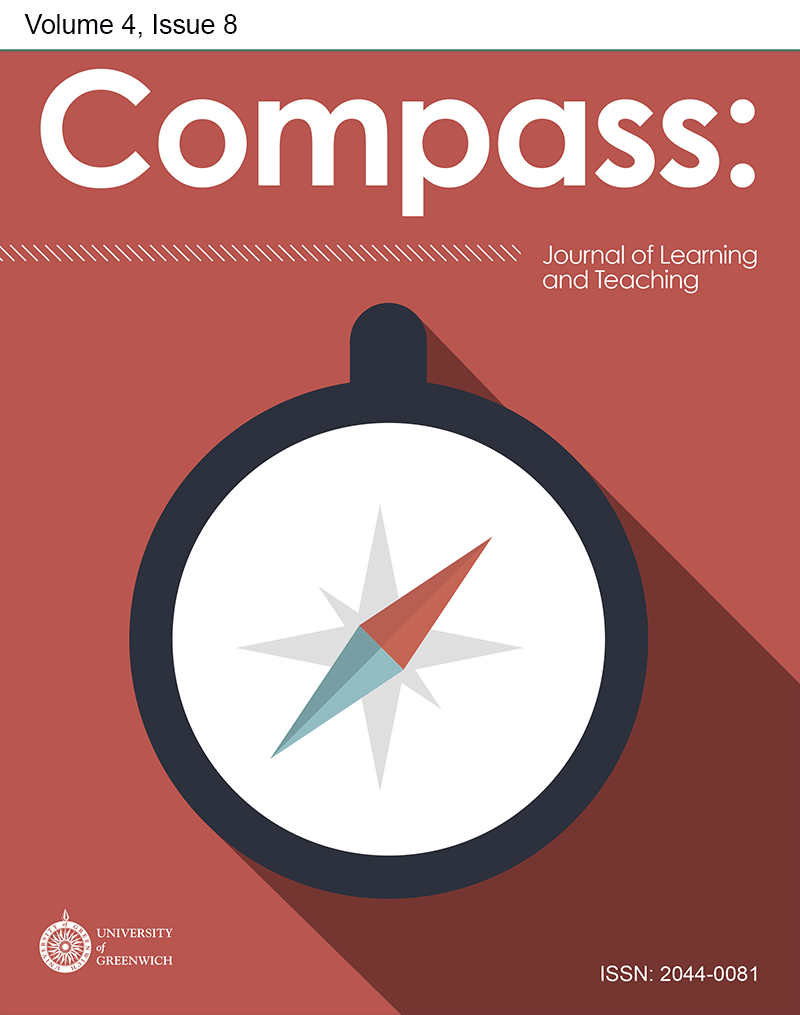Grounding research projects in the undergraduate curriculum: assessment strategies
DOI:
https://doi.org/10.21100/compass.v4i8.123Abstract
In their 2009 paper, Developing Undergraduate Research and Enquiry, Mick Healey and Alan Jenkins observed, “The key to developing undergraduate research and inquiry is to mainstream it and integrate it into the curriculum for all students” (Healey & Jenkins 2009, 6). The following case study gives an account of the steps taken to incorporate two research projects, one international and one community-based, into the final year undergraduate curriculum resulting in significant student success and programme development. Both used a grounded theory model. This led to the development of an assessment regime to achieve the dual aims of providing the student with the opportunity to learn through participatory research and, at the same time, furnishing the commissioner of the research with meaningful findings and recommendations.
References
Boyer Commission on Educating Undergraduates in the Research University (1998)
Reinventing Undergraduate Education: a Blueprint for America’s Research Universities. Stony Brook: State University of New York at Stony Brook. [Online]. Available at: http://www.niu.edu/engagedlearning/research/pdfs/Boyer_Report.pdf
(Accessed 30 April 2013).
Healey, M. & Jenkins, A., (2009) Developing Undergraduate Research and Enquiry, The Higher Education Academy. [Online]. Available at:
http://www.heacademy.ac.uk/assets/Documents/research/DevelopingUndergraduateResearchandInquiry.pdf (Accessed 29 April 2013).
Hellum, A. & Stewart, J. (editors) (1998) Pursuing Grounded Theory in Law: South-North Experiences in Developing Women’s Law. Harare: Mond Books.
Higher Education Academy Engineering Subject Centre (2013) Deep and Surface Approaches to Learning. [Online]. Available at: http://exchange.ac.uk/learning-and-teaching-theory-guide/deep-and-surface-approaches-learning.html (Accessed 21st September 2013).
Kerrigan, K. & Murray, V., (editors) (2011) A Student Guide to Clinical Legal Education and Pro Bono, Basingstoke: Palgrave Macmillan.
Kiley, M., Boud, D., Manathunga, C. & Cantwell, R. ‘Honouring the Incomparable: Honours in Australian Universities’ Higher Education (2011) 62:619–633.
Laycock, A., (1996) The Role of Women’s Law in Zimbabwe: From Legal Activism To African Jurisprudence, (LL.M Dissertation) University of Warwick.
Maboreke, M., (1990) ‘Introducing Women’s Law’, Stewart, J & Armstrong, A. (editors) Women and Law in Southern Africa Vol 2: The Legal Situation of Women in Southern Africa University of Zimbabwe Publications.
Macduff, A., (2005) ‘Deep learning, critical thinking and teaching for law reform’ Legal Education Review. Vol.15, no.1 & 2, 2005. pp. 125-35.
Phillips, E., Clarke, S., Crofts S., and Laycock, A. (2009) ‘Exceeding the boundaries of formulaic assessment: innovation and Creativity in the Law School’, The Law Teacher, Vol.44 No.3, 334-364.
Rioux, M., Basser, A. & Jones, M. (2011) Critical Perspectives on Human Rights and Disability Law. Leiden: Brill.
Strauss, A., & Cobin, J. (1998) Basics of Qualitative Research: Techniques and Procedures for Developing Grounded Theory. California: Sage Publications.
Wellington, J., (2011) ‘Supporting students’ preparation for the viva: their pre-conceptions and implications for practice’ Teaching in Higher Education Vol. 15, No. 1, February 2010, 71-84.
Downloads
Published
How to Cite
Issue
Section
License
Compass: Journal of Learning & Teaching provides immediate open access to its content on the principle that making research freely available to the public supports a more equitable global exchange of knowledge.
Works are released under the default licence of Creative Commons Attribution 4.0 International (CC BY), which provides unrestricted use, distribution, and reproduction in any medium, provided the original work is properly cited. If authors require a divergent licence, please contact the Scholarly Communications Manager at scholarlycommunications@greenwich.ac.uk.
Authors of articles published in Compass: Journal of Learning & Teaching remain the copyright holders to their published work and grant third parties the right to use, reproduce, and share the article according to terms of the Creative Commons license agreement applied to the work by Compass: Journal of Learning & Teaching.
Self-archiving policy: authors are permitted, and encouraged, to deposit any version of their article - submitted, accepted, and published versions - in subject and institutional repositories at any time.
If you have any queries about the choice of license, or which to discuss other options, please contact the Scholarly Communications Manager at scholarlycommunications@greenwich.ac.uk.



